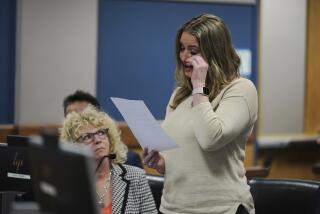The Misuse of Jury Consultants
- Share via
O.J. Simpson’s money has allowed him to play something denied most criminal case defendants: the jury manipulation game.
Most of the time, defendants’ attorneys pick jurors by a much speedier process, operating mostly by instinct. The Simpson defense team has hired an expensive jury consultant and undoubtedly has conducted polls and analyzed each prospective juror for pro and anti feelings toward Simpson. During the actual trial, the defense team may even create a “shadow jury,” a mock jury through which his attorneys can measure the effectiveness of their strategies and arguments. And, of course, the prosecution will have to match these efforts to remain competitive.
This use of polling and focus groups was developed by political campaign managers and advertising agencies. Their introduction to the courtroom more than 20 years ago was a major development in the law and, according to some legal scholars, has tilted the legal system toward those who can afford a jury consultant.
*
As a new book, “The Jury,” by Stephen J. Adler, puts it:
“Jurors who might once have served proudly and well are being excluded in voir dire, not just on a hunch, but on the analysis of a data driven scientist,” Adler writes. “Ironically, just as jury service laws have been changed to allow a broader cross-section of people into the jury room, technology has evolved to exclude new groups on the basis of their demographic characteristics, values and psyches.
“Juries are thus rendered less representative of their communities. And many well-qualified individuals become disappointed in a system that, despite its promise of inclusion, rejects them as jurors precisely because they would be fair and thoughtful decision makers.”
Jury selection has never been a job for idealists. Adler recalled a 1936 Esquire magazine article on the subject by Clarence Darrow, the famous defense lawyer. Working by the seat of his pants, long before today’s jury consultants, Darrow used his instincts, often bigoted, to file peremptory challenges, which can oust a prospective juror from the panel without a reason.
Darrow said he got rid of “the cold as the grave” Presbyterian, the “almost always sure to convict” Scandinavian, the “solemn” Christian Scientist and the very rich. “Next to the Board of Trade, for him, the penitentiary is the most important of all public buildings.”
As Darrow saw it, “the lawyer’s idea of justice is a verdict for his client and really this is the sole end for which he aims.”
Gut instinct was supplemented by social science in the early 1970s when academics offered to help the defense teams of Vietnam War protesters on trial for civil disobedience.
Their tools were the public opinion poll, the in-depth interview and the sample audience, which became, in their parlance, the shadow jury. “The idea was to leave little to chance,” Adler writes. “The jury could be shaped through peremptory challenges and trial strategy could be refined on the basis of a consultant’s pretrial analysis of how various approaches would be likely to play.”
By the mid-’70s, the tools, nurtured by the left, were adopted by corporate America in complex antitrust and liability cases. This moved jury consultants into the mainstream of the law--and into a lucrative business.
Today, they’re part of every big civil trial and in criminal trials where the defendants have money. Both the prosecution and the defense have hired them, and they participate in every jury selection move. Defense consultant Jo Ellan Dimitrius is at Simpson’s side during questioning of prospective jurors, going over the list with the defendant.
*
The professionals who are part of the system say there’s nothing wrong with this. Attorneys are
supposed to win for their clients, and anything goes, as long as it is legal.
On one level, I agree with them. If you’re in a fight, you try to win. But on another level, I’m offended by a practice that smacks of stealth rather than the openness we hope for in government institutions.
I understand how they feel. Usually, I write about politics, something I’ve done for many years. In the arena of politics, I tend to be an insider myself. I accept what political consultants do and view them as a necessary part of the system. I trade war stories with them about past campaigns and admire their skill at polling, getting out the vote and making commercials.
But this year, uninvolved with campaign coverage, I am much more aware of their negative force. They can use their polls and analyses to prepare advertisements that can switch votes and tip an election if the timing is right.
It’s a misuse of powerful techniques, treating voters like puppets on strings. Such games help make people cynical about politics, and about the courts.
*
A clarification: In a column last month, I incorrectly said that Judge Lance A. Ito banned cameras from the Simpson jury selection. Cameras are prohibited from covering jury selection by Rule 980 of the California rules of the court and the judge has no discretion in the matter.
The Simpson Case
* A package of photos, articles and other background information on the O.J. Simpson trial is available from TimesLink, the new on-line service of the Los Angeles Times.
Details on Times electronic services, B4.
More to Read
Sign up for our Book Club newsletter
Get the latest news, events and more from the Los Angeles Times Book Club, and help us get L.A. reading and talking.
You may occasionally receive promotional content from the Los Angeles Times.










